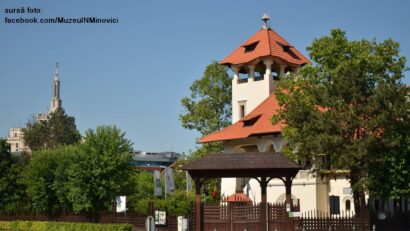Historian Ioan Mihalyi of Apsa
One of the most prominent figures of Maramures was historian Ioan Mihalyi of Apsa

România Internațional, 31.07.2022, 14:00
Maramures is one of the oldest historical provinces inhabited by Romanians. The Land of Marmures was one of the many medieval state entities in the Carpathian basin and was mentioned for the first time in official documents in 1199.The emergence of the Moldavian feudal state in the early 14th century is very much related to the Romanians in Maramures. Back then, the local ruler Dragos and his troops crossed the Carpathians to the east to form a defence line along the Hungarian border, which would become the nucleus of the Moldavian state.
The Land of Maramures was incorporated by the medieval Kingdom of Hungary and the local leaders were made nobles. After the Ottoman Empire conquered Hungary in 1526, Maramures became part of the Transylvanian voivodate, and in 1688 became part of Austria. In 1867, after the reform of the Habsburg Empire, and the establishment of Austria-Hungary, Maramures became a part of Hungary. After the first world war, in 1918, the representatives of the Romanians in Maramures voted for the union with the Kingdom of Romania.
One of the most prominent figures of Maramures was historian Ioan Mihalyi of Apsa. He was born in 1844 in the village of Middle Apsa, which today is part of Ukraine, into a family of Romanians with noble Middle Ages roots. His father had been a governor of Maramures, a revolutionary commissioner during the 1848-1849 revolution and a judge with the Hungarian Royal Court. His elder brother was Victor Mihalyi of Apsa, a bishop of the Romanian Church United with Rome from 1895 until 1918. Ioan followed in his fathers footsteps and studied law at the University of Budapest. In 1869 he got a PhD degree in law, being the first Romanian from Maramures to get such a title.
“One of Ioan Mihalyi of Apsas eight children was Lucia, born in 1903. In 1993, the Oral History Centre of the Romanian Radio Broadcasting Corporation had the big opportunity to to her, at the age of 91. Lucia Mihalyi of Apsa talked about the roots of her family and the bravery of her grandmother when her husband and other national Romanian leaders were sent to prison for alleged connections with the initiators of the 1948 Revolution. Lucia recalled her grandmothers story about how she was received by the Habsburg sovereign Franz Joseph.
My great grandfathers name was also Ioan Mihaly and he had 7 children. My grandfather was detained for supporting the revolutionaries. My grandmother, Iuliana Nan, went to Franz Joseph and requested an audience, as some of her nieces were court ladies there. She told Franz Joseph that my grandfather was not part of the revolutionaries group, he had just talked to them. Iosif Man, the last Romanian prefect in Maramures, talked to the revolutionaries coming from Baia Mare and intended to commit atrocities, as they had done in Transylvania. In Maramures the revolution was not bloody. Franz Joseph told my grandmother that he could not release them. And my grandma said: “What kind of emperor are you, if the Hungarians are not listening to you?” And Franz Joseph said that nobody had talked to him like that. Two weeks later, they were all released.
In the Hungarian capital, Ioan Mihalyi of Apsa was faced with beliefs that resonated with his own. He was particulary keen on the idea of Latinity, which he had heard about before in his family. A big part of studying law was history. The introduction of Hungarian as a study language in 1867 had become an even bigger a challenge for the young Romanians interested in finding their roots. So, Ioan Mihalyi of Apsa become a document editor and historian. His most important book, “Diplomas from 14th and 15th century Maramures” is a collection of documents about the Land of Maramures, the first of this kind about his native region, in Latin. And in 1902 the Romanian Academy recognized the special efforts made by the author in this regard and awarded him a prize.
Ioan Mihalyi of Apsa stood for the common Romanians who had no national or civic rights. He stressed his mission also before the representative of the Hungarian Government who was demanding loyalty by forcing the Romanian communities to speak Hungarian. Here is Lucia Mihalyi of Apsa recalling that meeting:
“They took the little church that my father had built. Because they demanded that Hungarian be used during the mass and also in the confessional school. And my father said: we have a 700-year-old Constitution. And if we use Hungarian at church and in school, then the peasants will no longer send their children to school. And a people that does not advance, will perish. He was told to go to Bucharest with his ideas, but my father said that those in Bucharest were Romanian and they did not need a lawyer. He said he would stay where he was to protect the peasants, as the peasants were really poor and oppressed by the Hungarian state.”
Ioan Mihalyi of Apsa died in 1914, before the Big War ended. A tough war, that entailed lots of sacrifices, and which ended with the opening of a new world in a new country for the Romanians in Maramures.






























